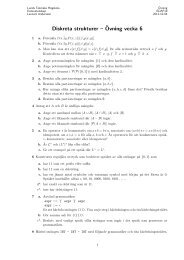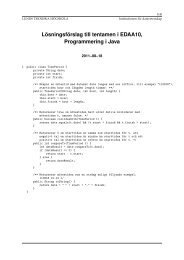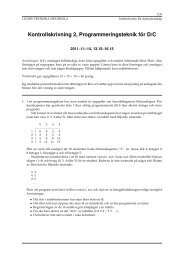Threads in the new ISO C Standard from 2011
Threads in the new ISO C Standard from 2011
Threads in the new ISO C Standard from 2011
You also want an ePaper? Increase the reach of your titles
YUMPU automatically turns print PDFs into web optimized ePapers that Google loves.
<strong>Threads</strong> <strong>in</strong> <strong>the</strong> <strong>new</strong> <strong>ISO</strong> C <strong>Standard</strong> <strong>from</strong> <strong>2011</strong><br />
Contents of Lecture 6<br />
Atomic objects (recall, object <strong>in</strong> <strong>ISO</strong> C term<strong>in</strong>ology = ”data”)<br />
Memory consistency model for non-atomic objects<br />
Synchronize with operation<br />
Dependency ordered memory accesses<br />
Happens before relation and data races<br />
Motivation <strong>from</strong> <strong>the</strong> L<strong>in</strong>ux kernel for dependency order<br />
Implementation on Power<br />
<strong>Threads</strong> API <strong>in</strong> C11 (very similar to Pthreads)<br />
Jonas Skeppstedt (js@cs.lth.se) Lecture 6 2013 1 / 70
C11<br />
Current <strong>ISO</strong> C <strong>Standard</strong> is C11 <strong>from</strong> December <strong>2011</strong>.<br />
See http://www.open-std.org/jtc1/sc22/wg14<br />
C11 conta<strong>in</strong>s various <strong>new</strong>s but we will focus on three <strong>in</strong> this course:<br />
Section 5.1.2.4 Multi-threaded executions and data races<br />
— similar to Pthreads<br />
— types, operators, and functions for atomic objects<br />
Jonas Skeppstedt (js@cs.lth.se) Lecture 6 2013 2 / 70
Atomic Objects<br />
Atomic objects are <strong>new</strong> <strong>in</strong> C11 and similar to Java volatile variables.<br />
Atomic objects can safely be accessed without lock<strong>in</strong>g:<br />
_Atomic <strong>in</strong>t counter = ATOMIC_VAR_INIT(0);<br />
Thread 1 Thread 2<br />
counter++; counter++;<br />
Of course, you may need locks for o<strong>the</strong>r reasons to protect your data.<br />
Atomic objects have a global modification order and all threads see<br />
<strong>the</strong> same modification order.<br />
There is no total modification order of all atomic objects — different<br />
threads can see <strong>the</strong> stores to different atomic objects <strong>in</strong> different<br />
orders.<br />
Jonas Skeppstedt (js@cs.lth.se) Lecture 6 2013 3 / 70
Syntax for Declar<strong>in</strong>g Atomic Objects<br />
A <strong>new</strong> type qualifier: _Atomic.<br />
The o<strong>the</strong>r type qualifiers are: const, volatile, restrict.<br />
Examples:<br />
_Atomic <strong>in</strong>t a; // atomic <strong>in</strong>t<br />
<strong>in</strong>t* _Atomic b; // atomic po<strong>in</strong>ter<br />
_Atomic <strong>in</strong>t* c; // po<strong>in</strong>ter to atomic <strong>in</strong>t<br />
_Atomic <strong>in</strong>t* _Atomic c; // atomic po<strong>in</strong>ter to atomic <strong>in</strong>t<br />
_Atomic struct { <strong>in</strong>t d; } e; // atomic struct<br />
In C++ it’s written as atomic a.<br />
For easier port<strong>in</strong>g C allows: _Atomic (type-name)<br />
Jonas Skeppstedt (js@cs.lth.se) Lecture 6 2013 4 / 70
Us<strong>in</strong>g Atomic Objects<br />
Members of an atomic struct/union may not be accessed <strong>in</strong>dividually.<br />
The whole struct must first be copied to a non-atomic variable of<br />
compatible type.<br />
The ++, --, and compound assignment operators (e.g. +=) are atomic<br />
read-modify-write operations.<br />
The size of atomic and non-atomic compatible types is typically<br />
different as well as <strong>the</strong> alignment requirements.<br />
The memory order<strong>in</strong>g when us<strong>in</strong>g <strong>the</strong>se operators is sequential<br />
consistency, which means costly memory fences are used.<br />
We will see functions for perform<strong>in</strong>g <strong>the</strong> same atomic operations<br />
which use relaxed memory order<strong>in</strong>g and may be preferable.<br />
Recall that alignment requirement refers to that for example a four<br />
byte <strong>in</strong>t must be given an address that is a multiple of four etc.<br />
Jonas Skeppstedt (js@cs.lth.se) Lecture 6 2013 5 / 70
<strong>Standard</strong> Atomic Data Types <strong>in</strong> <br />
def<strong>in</strong>es basic atomic types <strong>in</strong>clud<strong>in</strong>g<br />
atomic_char atomic_schar atomic_uchar<br />
atomic_short atomic_sshort atomic_ushort<br />
atomic_<strong>in</strong>t atomic_s<strong>in</strong>t atomic_u<strong>in</strong>t<br />
atomic_long atomic_slong atomic_ulong<br />
atomic_llong atomic_sllong atomic_ullong<br />
atomic_wchar_t atomic_<strong>in</strong>tptr_t atomic_u<strong>in</strong>tptr_t<br />
atomic_address atomic_bool atomic_flag<br />
atomic_flag is a lock-free struct.<br />
The o<strong>the</strong>r types might be implemented with locks.<br />
An atomic flag can be <strong>in</strong>itialized with ATOMIC_FLAG_INIT.<br />
Jonas Skeppstedt (js@cs.lth.se) Lecture 6 2013 6 / 70
Lock Free Property<br />
To know whe<strong>the</strong>r <strong>the</strong> o<strong>the</strong>r basic atomic types are lock free, <strong>the</strong><br />
follow<strong>in</strong>g macros can be evaluated:<br />
ATOMIC_CHAR_LOCK_FREE<br />
ATOMIC_CHAR16_T_LOCK_FREE<br />
ATOMIC_CHAR32_T_LOCK_FREE<br />
ATOMIC_WCHAR_T_LOCK_FREE<br />
ATOMIC_SHORT_LOCK_FREE<br />
ATOMIC_INT_LOCK_FREE<br />
ATOMIC_LONG_LOCK_FREE<br />
ATOMIC_LLONG_LOCK_FREE<br />
ATOMIC_ADDRESS_LOCK_FREE<br />
If for example ATOMIC_INT_LOCK_FREE is true <strong>the</strong>n both<br />
_Atomic signed <strong>in</strong>t and _Atomic unsigned <strong>in</strong>t are lock-free.<br />
Jonas Skeppstedt (js@cs.lth.se) Lecture 6 2013 7 / 70
Initializ<strong>in</strong>g an Atomic Object<br />
The <strong>in</strong>itialization itself is not atomic!<br />
Ei<strong>the</strong>r use ATOMIC_VAR_INIT(value), or<br />
void atomic_<strong>in</strong>it(volatile A* ptr, C value);<br />
Jonas Skeppstedt (js@cs.lth.se) Lecture 6 2013 8 / 70
Memory Order for Atomic Operations<br />
The enumerated type memory_order conta<strong>in</strong>s <strong>the</strong> enumerators<br />
memory_order_relaxed<br />
memory_order_consume<br />
memory_order_acquire<br />
memory_order_release<br />
memory_order_acq_rel<br />
memory_order_seq_cst<br />
They are used with <strong>the</strong> functions operat<strong>in</strong>g on atomic objects<br />
described next.<br />
For example:<br />
x = atomic_load_explicit(&a, memory_order_relaxed);<br />
y = atomic_load(&b);<br />
Without _explicit, memory_order_seq_cst is used.<br />
As we will see <strong>in</strong> detail <strong>the</strong> code becomes faster and more confus<strong>in</strong>g<br />
with memory_order_relaxed. Crash<strong>in</strong>g fast is better.<br />
Jonas Skeppstedt (js@cs.lth.se) Lecture 6 2013 9 / 70
Question<br />
Consider <strong>the</strong> code where all variables <strong>in</strong>itially are zero.<br />
// Thread 1<br />
x = atomic_load_explicit(&b, memory_order_relaxed);<br />
atomic_store_explicit(&a, x, memory_order_relaxed);<br />
// Thread 2<br />
y = atomic_load_explicit(&a, memory_order_relaxed);<br />
atomic_store_explicit(&b, 42, memory_order_relaxed);<br />
Can both x and y become 42?<br />
Jonas Skeppstedt (js@cs.lth.se) Lecture 6 2013 10 / 70
Answer: Yes<br />
The code may execute <strong>in</strong> <strong>the</strong> follow<strong>in</strong>g order:<br />
atomic_store_explicit(&b, 42, memory_order_relaxed); // Thread 2<br />
x = atomic_load_explicit(&b, memory_order_relaxed); // Thread 1<br />
atomic_store_explicit(&a, x, memory_order_relaxed); // Thread 1<br />
y = atomic_load_explicit(&a, memory_order_relaxed); // Thread 2<br />
With relaxed memory order<strong>in</strong>g and no dependency <strong>the</strong> store can be<br />
reordered and execute first.<br />
There is a dependency through <strong>the</strong> variable x between <strong>the</strong> accesses by<br />
Thread 1 — so <strong>the</strong>y may not be reordered, luckily.<br />
We will see more about dependences below.<br />
Jonas Skeppstedt (js@cs.lth.se) Lecture 6 2013 11 / 70
Atomic Exchange Macros<br />
These and <strong>the</strong> follow<strong>in</strong>g atomic operations are called functions <strong>in</strong> <strong>the</strong><br />
standard but are macros.<br />
A refers to an atomic type, e.g. _Atomic <strong>in</strong>t.<br />
C refers to <strong>the</strong> correspond<strong>in</strong>g non-atomic type, i.e. <strong>in</strong>t.<br />
The atomic exchange function writes a <strong>new</strong> value and returns <strong>the</strong> old<br />
value po<strong>in</strong>ted to by ptr.<br />
C atomic_exchange_explicit(volatile A* ptr, C value, memory_order order);<br />
C atomic_exchange(volatile A* ptr, C value);<br />
Jonas Skeppstedt (js@cs.lth.se) Lecture 6 2013 12 / 70
Atomic Compare and Exchange<br />
There are two versions: strong and weak.<br />
The weak may fail (and let you know) and must <strong>the</strong>refore be used <strong>in</strong> a<br />
loop.<br />
The functions compare <strong>the</strong> value at <strong>the</strong> location po<strong>in</strong>ted to by ptr<br />
with an expected value and if <strong>the</strong>y are equal writes a <strong>new</strong> value.<br />
The result of <strong>the</strong> comparison is returned.<br />
If <strong>the</strong> values are not equal, <strong>the</strong> current value is copied to expected, or<br />
actually to where <strong>the</strong> po<strong>in</strong>ter expected po<strong>in</strong>ts.<br />
The strong functions behave as:<br />
if (*ptr == *expected)<br />
*ptr = value;<br />
else<br />
*expected = *ptr;<br />
Jonas Skeppstedt (js@cs.lth.se) Lecture 6 2013 13 / 70
Atomic Compare and Exchange Function Prototypes<br />
bool atomic_compare_exchange_strong_explicit(<br />
volatile A* ptr,<br />
C* expected,<br />
C value,<br />
memory_order success,<br />
memory_order failure);<br />
bool atomic_compare_exchange_weak_explicit(<br />
volatile A* ptr,<br />
C* expected,<br />
C value,<br />
memory_order success,<br />
memory_order failure);<br />
bool atomic_compare_exchange_strong(<br />
volatile A* ptr,<br />
C* expected,<br />
C value);<br />
bool atomic_compare_exchange_weak(<br />
volatile A* ptr,<br />
C* expected,<br />
C value);<br />
For <strong>the</strong> explicit functions, memory is affected accord<strong>in</strong>g to parameters<br />
success and failure, depend<strong>in</strong>g on <strong>the</strong> result of <strong>the</strong> comparison.<br />
Jonas Skeppstedt (js@cs.lth.se) Lecture 6 2013 14 / 70
Weak Compare and Exchange Functions<br />
The weak compare and exchange functions may fail spuriously, which<br />
means <strong>the</strong>y fail to perform <strong>the</strong> compare and exchange and ”give up”.<br />
If so, <strong>the</strong> return value is guaranteed to be false, and <strong>the</strong> current value<br />
is not copied to what ptr po<strong>in</strong>ts.<br />
The weak forms allow faster implementation on mach<strong>in</strong>es with<br />
load-locked/load-l<strong>in</strong>ked/load-and-reserve and store conditional<br />
<strong>in</strong>structions — <strong>in</strong>stead of atomic compare and exchange.<br />
The load-locked type of <strong>in</strong>structions are described below but <strong>the</strong> ide<br />
and ta is to split <strong>the</strong> atomic operation <strong>in</strong>to two <strong>in</strong>structions.<br />
A processor P first performs a load-locked and <strong>the</strong>n a store<br />
conditional.<br />
If a different processor Q performs a store between <strong>the</strong> load-locked<br />
and store conditional made by P, <strong>the</strong>n <strong>the</strong> store conditional made by<br />
P fails.<br />
Jonas Skeppstedt (js@cs.lth.se) Lecture 6 2013 15 / 70
Us<strong>in</strong>g <strong>the</strong> Weak Compare and Exchange Functions<br />
_Atomic <strong>in</strong>t a;<br />
<strong>in</strong>t exp;<br />
<strong>in</strong>t value;<br />
exp = atomic_load(&a);<br />
do<br />
value = f(exp);<br />
while (!atomic_compare_exchange_weak(&a, &exp, value));<br />
Jonas Skeppstedt (js@cs.lth.se) Lecture 6 2013 16 / 70
Atomic Fetch and Modify Functions<br />
These functions atomically read-compute-modify an atomic object.<br />
computation C operator function<br />
addition + atomic_fetch_add_explicit<br />
subtraction - atomic_fetch_sub_explicit<br />
or | atomic_fetch_or_explicit<br />
xor ^ atomic_fetch_xor_explicit<br />
and & atomic_fetch_and_explicit<br />
Plus <strong>the</strong> usual non-explicit functions, for example:<br />
C atomic_fetch_add(volatile A* ptr, M value); adds value<br />
to what A po<strong>in</strong>ts to.<br />
If A is arithmetic <strong>the</strong>n M is C and if it’s atomic_address <strong>the</strong>n M is<br />
ptr_diff_t.<br />
The value of *ptr before <strong>the</strong> operation is returned.<br />
Jonas Skeppstedt (js@cs.lth.se) Lecture 6 2013 17 / 70
Test and Set Atomic Flag<br />
The type atomic_flag is <strong>the</strong> atomic type for <strong>the</strong> classic test-and-set<br />
operation.<br />
bool atomic_flag_test_and_set(<br />
volatile atomic_flag* ptr);<br />
bool atomic_flag_test_and_set_explicit(<br />
volatile atomic_flag* ptr,<br />
memory_order order);<br />
These functions set <strong>the</strong> flag if it was cleared.<br />
If it already was set, it may be written aga<strong>in</strong> but that would be a poor<br />
implementation due to cache effects if multiple processors are wait<strong>in</strong>g<br />
for <strong>the</strong> flag to be cleared.<br />
The old value is returned.<br />
Jonas Skeppstedt (js@cs.lth.se) Lecture 6 2013 18 / 70
Atomic Flag<br />
The atomic flag type and functions are <strong>the</strong> m<strong>in</strong>imal hardware<br />
supported atomic operations.<br />
All o<strong>the</strong>rs can be implemented us<strong>in</strong>g <strong>the</strong>se.<br />
However, better performance can be achieved with more hardware<br />
support.<br />
Jonas Skeppstedt (js@cs.lth.se) Lecture 6 2013 19 / 70
Clear Atomic Flag<br />
bool atomic_flag_clear(<br />
volatile atomic_flag* ptr);<br />
bool atomic_flag_clear_explicit(<br />
volatile atomic_flag* ptr,<br />
memory_order order);<br />
These functions clear <strong>the</strong> flag.<br />
The order may nei<strong>the</strong>r be memory_order_acquire nor<br />
memory_order_acq_rel<br />
Jonas Skeppstedt (js@cs.lth.se) Lecture 6 2013 20 / 70
The C11 Memory Consistency Model for Non-Atomic<br />
Objects<br />
Initially some <strong>in</strong> <strong>the</strong> standardization committee wanted to standardize<br />
on sequential consistency.<br />
Fortunately, C11 has standardized on a relaxed memory model for<br />
non-atomic objects.<br />
This is partly based on <strong>in</strong>put <strong>from</strong> L<strong>in</strong>ux kernel developers.<br />
Thus, to make an assignment visible to ano<strong>the</strong>r thread requires<br />
synchronization between <strong>the</strong> writ<strong>in</strong>g and read<strong>in</strong>g threads.<br />
There are three ma<strong>in</strong> k<strong>in</strong>ds of synchronization and we will start with<br />
mutex unlock/lock.<br />
Jonas Skeppstedt (js@cs.lth.se) Lecture 6 2013 21 / 70
Mutex Unlock/Lock<br />
A mutex <strong>in</strong> C11 is called mtx_t<br />
<strong>in</strong>t a;<br />
Thread 1 Thread 2<br />
mtx_lock(&m);<br />
a = 1;<br />
mtx_unlock(&m);<br />
mtx_lock(&m);<br />
pr<strong>in</strong>tf("a = %d\n", a);<br />
mtx_unlock(&m);<br />
The unlock by Thread 1 and lock by Thread 2 make <strong>the</strong> write of a<br />
visible to Thread 2.<br />
A part of <strong>the</strong> mutex unlock is to perform a release operation and of<br />
a mutex lock to perform an acquire operation.<br />
The write by Thread 1 is said to happen before <strong>the</strong> read by Thread 2.<br />
Jonas Skeppstedt (js@cs.lth.se) Lecture 6 2013 22 / 70
Release and Acquire, and Consume<br />
Recall, a release makes previous writes visible to o<strong>the</strong>r threads.<br />
A release orders memory accesses so that no preced<strong>in</strong>g write may be<br />
moved to after <strong>the</strong> release by <strong>the</strong> compiler or hardware.<br />
An acquire makes writes by o<strong>the</strong>r threads that have made a release<br />
visible.<br />
An acquire orders memory accesses so that no subsequent read or<br />
write may be moved to before <strong>the</strong> acquire.<br />
A consume is similar to an acquire but it lets unrelated reads be<br />
moved by <strong>the</strong> compiler to before <strong>the</strong> consume. In addition it can be<br />
implemented faster on some mach<strong>in</strong>es <strong>in</strong>clud<strong>in</strong>g Power.<br />
Release/acquire is different <strong>from</strong> unlock/lock but unlock/lock perform<br />
release/aqcuire <strong>in</strong> addition to keep<strong>in</strong>g track of <strong>the</strong> lock value.<br />
Jonas Skeppstedt (js@cs.lth.se) Lecture 6 2013 23 / 70
Conflict<strong>in</strong>g Expression Evaluations<br />
Two expression evaluations conflict if <strong>the</strong>y access <strong>the</strong> same memory<br />
location and at least one of <strong>the</strong>m modifies that location.<br />
For example:<br />
// Thread 1 // Thread 2<br />
a = b + c;<br />
d = a + 1;<br />
An assignment is an expression so <strong>the</strong> code above conflict.<br />
By evaluation is meant that <strong>the</strong> expressions are computed at runtime.<br />
Conflict<strong>in</strong>g evaluations are necessary <strong>in</strong> parallel programs unless each<br />
thread can work exclusively on its own data.<br />
Conflict<strong>in</strong>g evaluations become a big problem if <strong>the</strong>y are not ordered<br />
through <strong>the</strong> happens before relation.<br />
Jonas Skeppstedt (js@cs.lth.se) Lecture 6 2013 24 / 70
Happens Before and Data Races<br />
We will look at <strong>the</strong> details of <strong>the</strong> happens before relation and what it<br />
means <strong>in</strong> terms of execut<strong>in</strong>g C code at <strong>the</strong> mach<strong>in</strong>e <strong>in</strong>struction level<br />
below, after <strong>in</strong>troduc<strong>in</strong>g happens before <strong>in</strong>formally.<br />
It is <strong>the</strong> unlock/lock pair which guarantees that <strong>the</strong> write happens<br />
before <strong>the</strong> read and that <strong>the</strong> data becomes visible to <strong>the</strong> o<strong>the</strong>r thread.<br />
S<strong>in</strong>ce <strong>the</strong>re is no synchronization <strong>in</strong> <strong>the</strong> previous slide <strong>the</strong>re is a data<br />
race, obviously.<br />
An unlock on m synchronizes with a lock on m.<br />
Recall that mutex unlock/lock is one of three ma<strong>in</strong> k<strong>in</strong>ds of<br />
synchronizations which orders two variable accesses.<br />
The o<strong>the</strong>r two are:<br />
Release on an atomic object M followed by acquire or consume on M<br />
Memory fences.<br />
There are additional important details for atomic objects and fences<br />
which we will see later.<br />
Jonas Skeppstedt (js@cs.lth.se) Lecture 6 2013 25 / 70
Summary so far<br />
An essential property of parallel C programs is that we have ordered all<br />
memory accesses through <strong>the</strong> happens before relation which will be<br />
expla<strong>in</strong>ed <strong>in</strong> detail soon.<br />
If you use mutexes to order <strong>the</strong> accesses, you will be safe.<br />
Atomic objects and fences are <strong>in</strong>tended for use when:<br />
Mutexes don’t give sufficient performance.<br />
You implement o<strong>the</strong>r high level synchronization primitives.<br />
We will next expla<strong>in</strong> <strong>the</strong> happens before relation <strong>in</strong> detail.<br />
Then we will show concrete examples of us<strong>in</strong>g atomic objects<br />
<strong>in</strong>clud<strong>in</strong>g implementation details for Power processors.<br />
Jonas Skeppstedt (js@cs.lth.se) Lecture 6 2013 26 / 70
Sequenced Before<br />
The most common sequence po<strong>in</strong>t <strong>in</strong> C/C++ is semicolon.<br />
O<strong>the</strong>rs <strong>in</strong>clude:<br />
Function call<br />
Comma operator<br />
After evaluat<strong>in</strong>g <strong>the</strong> left operand of ?:, && and ||.<br />
Below at L, <strong>the</strong> assignment to and use of v not sequenced.<br />
<strong>in</strong>t u = 1, v = 2, w;<br />
L: w = (v = u + 3) + v * 4;<br />
It is legal C but <strong>the</strong> value of w can become ei<strong>the</strong>r 12 or 20.<br />
It is due to it is unspecified which operand of + is evaluated first.<br />
In <strong>the</strong> follow<strong>in</strong>g w becomes 20 s<strong>in</strong>ce comma is a sequence po<strong>in</strong>t.<br />
w = (v = u + 3), v * 4;<br />
Jonas Skeppstedt (js@cs.lth.se) Lecture 6 2013 27 / 70
Memory Fences<br />
These are also called memory barriers and are used frequently <strong>in</strong> <strong>the</strong><br />
L<strong>in</strong>ux kernel.<br />
A memory fence is one of:<br />
release fence<br />
acquire fence<br />
both release and acquire fence<br />
A fence has no memory location operand.<br />
Two threads T1 and T2 synchronize us<strong>in</strong>g a fence if T1 writes to an<br />
atomic object M after <strong>the</strong> release fence which is read by T2 before <strong>the</strong><br />
acquire fence.<br />
Details on <strong>the</strong> follow<strong>in</strong>g slides.<br />
Jonas Skeppstedt (js@cs.lth.se) Lecture 6 2013 28 / 70
An Example<br />
_Atomic <strong>in</strong>t m;<br />
<strong>in</strong>t u;<br />
// Thread 1 Thread 2<br />
u = 1;<br />
atomic_thread_fence(memory_order_release); // A<br />
atomic_store_explicit(&m, 1, memory_order_relaxed); // X<br />
atomic_load_explicit(&m, memory_order_relaxed); // Y<br />
atomic_thread_fence(memory_order_acquire); // B<br />
pr<strong>in</strong>tf("u = %d\n", u);<br />
Accesses to atomic objects do not produce data races.<br />
Simply runn<strong>in</strong>g <strong>the</strong> two threads does not order <strong>the</strong>m <strong>in</strong> any way.<br />
Only if Thread 2 reads m after <strong>the</strong> write <strong>the</strong>n it knows that <strong>the</strong> value<br />
of u is correct.<br />
The modification of u happens before <strong>the</strong> read of u.<br />
Jonas Skeppstedt (js@cs.lth.se) Lecture 6 2013 29 / 70
Synchronize with us<strong>in</strong>g Fences<br />
A release fence A synchronizes with an acquire fence B if <strong>the</strong>re exist<br />
atomic operations X and Y which operate on an atomic object M and<br />
X is sequenced after A,<br />
Y is sequenced before B,<br />
Y reads a value written by X or <strong>the</strong> hypo<strong>the</strong>tical release sequence<br />
headed by X if it were a release.<br />
One of A and B can be replaced with an atomic operation, which<br />
elim<strong>in</strong>ates <strong>the</strong> need for ei<strong>the</strong>r X or Y .<br />
A and X can be replaced with a release operation on M.<br />
Y and B can be replaced with an acquire operation on M.<br />
Jonas Skeppstedt (js@cs.lth.se) Lecture 6 2013 30 / 70
Dependences<br />
Dependences are <strong>in</strong>tra-thread (with<strong>in</strong> one thread only).<br />
There are two k<strong>in</strong>ds of dependences:<br />
Data dependence — due to writ<strong>in</strong>g and read<strong>in</strong>g a memory location.<br />
Control dependence — due to branches such as if-statements.<br />
Only data dependences are considered <strong>in</strong> C11.<br />
As we will see, this can lead to unexpected results.<br />
When we talk about ”dependences” <strong>from</strong> now on, we only mean data<br />
dependences.<br />
Jonas Skeppstedt (js@cs.lth.se) Lecture 6 2013 31 / 70
Dependences between Intra-Thread Evaluations<br />
Consider two expression evaluations A and B made by one thread.<br />
When we say that A carries a dependency to B it means A must be<br />
evaluated before B:<br />
v = u + 1; // A<br />
w = v * 2; // B<br />
The order of A and B should not be changed!<br />
Both compilers and hardware must preserve this order — and <strong>the</strong>y do.<br />
A is sequenced before B s<strong>in</strong>ce <strong>the</strong>re is a sequence po<strong>in</strong>t between<br />
A and B.<br />
Jonas Skeppstedt (js@cs.lth.se) Lecture 6 2013 32 / 70
Def<strong>in</strong>ition of Dependency <strong>in</strong> C11<br />
A carries a dependency to B if<br />
<strong>the</strong> value of A is used as an operand of B (except <strong>the</strong> left operand of<br />
?: , && or ||), or<br />
A writes a scalar object (po<strong>in</strong>ter or arithmetic variable) or a bitfield <strong>in</strong><br />
memory location M and B reads <strong>from</strong> M <strong>the</strong> value written by A, and A<br />
is sequenced before B<br />
For some evaluation X , A carries a dependence to X and X carries a<br />
dependency to B.<br />
Carries a dependency is <strong>in</strong>tra-thread.<br />
Jonas Skeppstedt (js@cs.lth.se) Lecture 6 2013 33 / 70
Dependency-Ordered<br />
A release sequence is a maximal sequence of modifications of M<br />
headed by a release operation on M and performed by that thread or<br />
by o<strong>the</strong>r threads perform<strong>in</strong>g atomic read-modify-write accesses on M.<br />
Recall, a consume operation is like an acquire except it allows more<br />
optimizations on some mach<strong>in</strong>es, e.g. on <strong>the</strong> Power it becomes an<br />
ord<strong>in</strong>ary load <strong>in</strong>struction.<br />
An evaluation A <strong>in</strong> one thread is dependency ordered before an<br />
evaluation B <strong>in</strong> ano<strong>the</strong>r thread if:<br />
A performs a release operation on an atomic object M and B performs<br />
a consume operation on M and reads a value written by any side effect<br />
of A <strong>in</strong> <strong>the</strong> release sequence of A, or<br />
for some evaluation X , A is dependency ordered before X and X<br />
carries a dependency to B.<br />
Jonas Skeppstedt (js@cs.lth.se) Lecture 6 2013 34 / 70
Inter-Thread Happens Before<br />
An evaluation A <strong>in</strong>ter-thread happens before an evaluation B if:<br />
A synchronizes with B (mutex unlock/lock), or<br />
A is dependency ordered before B (release/consume), or<br />
for some evaluation X :<br />
A synchronizes with X and X is sequenced before B, or<br />
A is sequenced before X and X synchronizes with B, or<br />
A <strong>in</strong>ter-thread happens before X and X <strong>in</strong>ter-thread happens before B.<br />
An evaluation A happens before an evaluation B if:<br />
A is sequenced before B (<strong>in</strong>tra-thread), or<br />
A is <strong>in</strong>ter-thread happens before B.<br />
C11, Section 5.1.2.4 paragraph 25:<br />
The execution of a program conta<strong>in</strong>s a data race if it conta<strong>in</strong>s two<br />
conflict<strong>in</strong>g actions <strong>in</strong> different threads, at least one of which is not<br />
atomic, and nei<strong>the</strong>r happens before <strong>the</strong> o<strong>the</strong>r. Any such data race<br />
results <strong>in</strong> undef<strong>in</strong>ed behavior.<br />
Jonas Skeppstedt (js@cs.lth.se) Lecture 6 2013 35 / 70
Motivation for Dependency Order<strong>in</strong>g<br />
Improved performance!<br />
In programs (such as <strong>the</strong> L<strong>in</strong>ux kernel) with important data structures<br />
which are rarely modified and very frequently read <strong>the</strong>re exist faster<br />
solutions than us<strong>in</strong>g full release/acquire synchronization on modern<br />
architectures.<br />
In this sense modern architectures <strong>in</strong>clude Power, MIPS and ARM.<br />
For o<strong>the</strong>r architectures <strong>in</strong>clud<strong>in</strong>g x86, optimiz<strong>in</strong>g compilers can make<br />
better optimizations if dependency order<strong>in</strong>g is used ra<strong>the</strong>r than<br />
release/acquire, as we will see below.<br />
Jonas Skeppstedt (js@cs.lth.se) Lecture 6 2013 36 / 70
Read-Copy Update<br />
RCU is an alternative to readers-writers locks with <strong>the</strong> follow<strong>in</strong>g<br />
essential functionality:<br />
Po<strong>in</strong>ters to data structures are protected with RCU.<br />
Readers use read-side critical sections marked by enter/exit calls.<br />
When a reader is <strong>in</strong> such a section a writer may not modify <strong>the</strong> data<br />
structure but <strong>in</strong>stead modifies a copy of it.<br />
When <strong>the</strong> last reader has left, <strong>the</strong> orig<strong>in</strong>al data structure is updated.<br />
RCU is heavily used <strong>in</strong> <strong>the</strong> L<strong>in</strong>ux kernel.<br />
RCU was one part of <strong>the</strong> SCO vs IBM lawsuit.<br />
From l<strong>in</strong>ux-2.6.37.1/kernel/signal.c<br />
/∗<br />
∗ Protect access to @t credentials . This can go away when all<br />
∗ callers hold rcu read lock .<br />
∗/<br />
rcu_read_lock();<br />
user = get_uid(__task_cred(t)->user);<br />
atomic_<strong>in</strong>c(&user->sigpend<strong>in</strong>g);<br />
rcu_read_unlock();<br />
Jonas Skeppstedt (js@cs.lth.se) Lecture 6 2013 37 / 70
From <strong>the</strong> L<strong>in</strong>ux Kernel Documentation<br />
rcu_dereference()<br />
typeof(p) rcu_dereference(p);<br />
Like rcu_assign_po<strong>in</strong>ter(), rcu_dereference() must be implemented<br />
as a macro.<br />
The reader uses rcu_dereference() to fetch an RCU-protected<br />
po<strong>in</strong>ter, which returns a value that may <strong>the</strong>n be safely<br />
dereferenced. Note that rcu_deference() does not actually<br />
dereference <strong>the</strong> po<strong>in</strong>ter, <strong>in</strong>stead, it protects <strong>the</strong> po<strong>in</strong>ter for<br />
later dereferenc<strong>in</strong>g. It also executes any needed memory-barrier<br />
<strong>in</strong>structions for a given CPU architecture. Currently, only Alpha<br />
needs memory barriers with<strong>in</strong> rcu_dereference() -- on o<strong>the</strong>r CPUs,<br />
it compiles to noth<strong>in</strong>g, not even a compiler directive.<br />
Jonas Skeppstedt (js@cs.lth.se) Lecture 6 2013 38 / 70
A Simplified Example<br />
Consider <strong>the</strong> follow<strong>in</strong>g example code (also orig<strong>in</strong>ally <strong>from</strong> L<strong>in</strong>ux)<br />
list_t* head;<br />
<strong>in</strong>t b;<br />
void <strong>in</strong>sert(<strong>in</strong>t a)<br />
{<br />
list_t* p = kmalloc(sizeof *p, GFP_KERNEL);<br />
}<br />
sp<strong>in</strong>_lock(&m);<br />
p->a = 1;<br />
p->next = head;<br />
rcu_assign_po<strong>in</strong>ter(head, p);<br />
sp<strong>in</strong>_unlock(&m);<br />
void first(void)<br />
{<br />
list_t* q = rcu_dereference(head);<br />
}<br />
return q->a + b;<br />
The use of rcu_dereference() must be done with<strong>in</strong> an<br />
rcu_read_lock() / rcu_read_unlock() — not seen <strong>in</strong> this<br />
example.<br />
Jonas Skeppstedt (js@cs.lth.se) Lecture 6 2013 39 / 70
A More Detailed Look<br />
<strong>in</strong>t b;<br />
void first(void)<br />
{<br />
list_t* q = rcu_dereference(head);<br />
}<br />
return q->a + b;<br />
Before <strong>the</strong> proposal for dependency order<strong>in</strong>g through release/consume,<br />
<strong>the</strong> <strong>the</strong>n current draft would require <strong>the</strong> use of an acquire operation <strong>in</strong><br />
<strong>the</strong> rcu_dereference.<br />
Do<strong>in</strong>g so prevents <strong>the</strong> compiler <strong>from</strong> load<strong>in</strong>g b before <strong>the</strong> execution of<br />
<strong>the</strong> rcu_dereference.<br />
A standard for a high performance language must permit extensive<br />
compiler optimization and efficient execution on modern mach<strong>in</strong>es.<br />
C11 succeeds with this — also for multicores.<br />
Jonas Skeppstedt (js@cs.lth.se) Lecture 6 2013 40 / 70
More Details About Dependences<br />
Recall <strong>the</strong> <strong>in</strong>tra-thread A carries a dependency to B.<br />
The compiler becomes responsible for not optimiz<strong>in</strong>g away such<br />
dependences.<br />
This might sound trivial but is not. See below.<br />
A dependency is started with a consume operation:<br />
p = atomic_load(q, memory_order_consume);<br />
a = *p + 1;<br />
A root of a dependency tree is created with <strong>the</strong> consume, and <strong>the</strong><br />
memory read <strong>in</strong> *p becomes ordered, as we expect.<br />
The compiler or hardware is not allowed to move <strong>the</strong> *p to before <strong>the</strong><br />
first l<strong>in</strong>e which would probably not make much sense, anyway.<br />
Behaviour is as we want and expect.<br />
Jonas Skeppstedt (js@cs.lth.se) Lecture 6 2013 41 / 70
Constant Propagation Example 1(3)<br />
Consider <strong>the</strong> follow<strong>in</strong>g code and assume <strong>the</strong> compiler has deduced<br />
size is one:<br />
i = atomic_load(q, memory_order_consume);<br />
a = b[i % size];<br />
What happens if <strong>the</strong> compiler transforms <strong>the</strong> code to <strong>the</strong> follow<strong>in</strong>g?<br />
i = atomic_load(q, memory_order_consume);<br />
a = *b;<br />
Jonas Skeppstedt (js@cs.lth.se) Lecture 6 2013 42 / 70
Constant Propagation Example 2(3)<br />
There is now no dependence between <strong>the</strong> two statements!<br />
i = atomic_load(q, memory_order_consume);<br />
a = *b;<br />
Without a dependence <strong>the</strong> reads are not ordered.<br />
This is not what <strong>the</strong> programmer expected!!!<br />
Therefore, optimiz<strong>in</strong>g C compilers must analyse all dependences<br />
before any code transformation and preserve <strong>the</strong>m.<br />
What does ”preserve” mean, <strong>the</strong>n?<br />
Jonas Skeppstedt (js@cs.lth.se) Lecture 6 2013 43 / 70
Constant Propagation Example 3(3)<br />
Preserv<strong>in</strong>g <strong>the</strong> data dependency means lett<strong>in</strong>g <strong>the</strong> hardware know<br />
about <strong>the</strong>m.<br />
That can be done <strong>in</strong> different ways for different processors.<br />
One way is to <strong>in</strong>sert <strong>in</strong>structions so that <strong>the</strong>re will be a cha<strong>in</strong> of<br />
dependences for <strong>the</strong> processor pipel<strong>in</strong>e to see.<br />
Compilers thus must preserve such dependences <strong>in</strong> <strong>the</strong> complete<br />
program!<br />
Writ<strong>in</strong>g optimiz<strong>in</strong>g compilers C all of a sudden became twice as<br />
<strong>in</strong>terest<strong>in</strong>g.<br />
There is, however, a very simple first version implementation: treat all<br />
memory_order_consume as memory_order_acquire which<br />
automatically will order <strong>the</strong> memory accesses.<br />
Jonas Skeppstedt (js@cs.lth.se) Lecture 6 2013 44 / 70
One More Data Dependency<br />
a = atomic_load(p, memory_order_consume);<br />
atomic_store(q, a, memory_order_relaxed);<br />
atomic_store(r, b, memory_order_relaxed);<br />
S<strong>in</strong>ce <strong>the</strong>re is no data dependency between <strong>the</strong> consume and <strong>the</strong><br />
second store, <strong>the</strong>y are not ordered.<br />
As programmers we need to be very careful about what we expect to<br />
be ordered!<br />
Jonas Skeppstedt (js@cs.lth.se) Lecture 6 2013 45 / 70
More Details Next<br />
Implementation on a specific architecture: Power.<br />
Illustrations of what actually is ordered for several situations.<br />
We will beg<strong>in</strong> with <strong>the</strong> Power synchronization <strong>in</strong>structions.<br />
Approximate clock counts below are not fixed but depends on what is<br />
happen<strong>in</strong>g <strong>in</strong> <strong>the</strong> mach<strong>in</strong>e at <strong>the</strong> moment.<br />
Numbers <strong>from</strong> Christoph von Praun: ”Deconstruct<strong>in</strong>g Redundant<br />
Memory Synchronization” (while at IBM Research).<br />
mnemonic name Power4 cycles Power5 cycles<br />
ldarw/stwxc. load and reserve / store conditional 80 75<br />
hwsync or sync heavy weight sync 140 50<br />
lwsync light weight sync 110 25<br />
isync <strong>in</strong>struction sync 30 10<br />
eieio enforce <strong>in</strong>order execution of I/O not measured not measured<br />
We want to use functions which use <strong>the</strong> less costly <strong>in</strong>structions!<br />
Such as <strong>the</strong> consume operation which is only an ord<strong>in</strong>ary load<br />
<strong>in</strong>struction on Power!<br />
Jonas Skeppstedt (js@cs.lth.se) Lecture 6 2013 46 / 70
Load and Reserve/Store Conditional Purpose<br />
Some processors use atomic test-and-set <strong>in</strong>structions while o<strong>the</strong>rs use<br />
pairs of special load and store <strong>in</strong>structions.<br />
Load and reserve is also called load-locked and load-l<strong>in</strong>ked.<br />
In addition to Power, it’s used by ARM and MIPS.<br />
Test-and-set, or compare-and-swap, is used by e.g. x86.<br />
The purpose with load-and-reserve/store conditional is to simplify <strong>the</strong><br />
design of <strong>the</strong> pipel<strong>in</strong>e.<br />
Jonas Skeppstedt (js@cs.lth.se) Lecture 6 2013 47 / 70
Load and Reserve/Store Conditional Behaviour<br />
The load <strong>in</strong>struction fetches data <strong>from</strong> a memory location, and makes<br />
a reservation R <strong>in</strong> memory.<br />
If a different processor modifies <strong>the</strong> same memory location, <strong>the</strong><br />
reservation R is lost.<br />
If/when <strong>the</strong> processor with a reservation makes a conditional store,<br />
<strong>the</strong> memory location is modified only if <strong>the</strong> reservation was not lost <strong>in</strong><br />
between.<br />
Therefore it’s an atomic read-modify-write.<br />
The stwcx. conditional store <strong>in</strong> Power sets a condition code to<br />
<strong>in</strong>dicate whe<strong>the</strong>r <strong>the</strong> store succeeded or not (<strong>the</strong> dot <strong>in</strong> <strong>the</strong> mnemonic<br />
<strong>in</strong>dicates that <strong>the</strong> condition code is set by an operation on Power).<br />
Jonas Skeppstedt (js@cs.lth.se) Lecture 6 2013 48 / 70
Power Memory Barrier Instructions<br />
The Power memory barrier <strong>in</strong>structions create a memory barrier with<br />
two sets of <strong>in</strong>structions:<br />
<strong>the</strong> A-set with <strong>in</strong>structions ai preced<strong>in</strong>g <strong>the</strong> barrier, and<br />
<strong>the</strong> B-set with <strong>in</strong>structions bj follow<strong>in</strong>g <strong>the</strong> barrier.<br />
Depend<strong>in</strong>g on which barrier <strong>in</strong>struction is used, some bj <strong>in</strong>structions<br />
may be reordered with some ai <strong>in</strong>structions.<br />
Jonas Skeppstedt (js@cs.lth.se) Lecture 6 2013 49 / 70
hwsync Memory Barrier for Sequential Consistency<br />
The A-set consists of all <strong>in</strong>structions preced<strong>in</strong>g <strong>the</strong> hwsync.<br />
The B-set consists of memory access <strong>in</strong>structions follow<strong>in</strong>g <strong>the</strong><br />
hwsync.<br />
Except for <strong>the</strong> <strong>in</strong>struction icbi which <strong>in</strong>validates an <strong>in</strong>struction cache<br />
block, no B-set <strong>in</strong>struction may be reordered with any A-set<br />
<strong>in</strong>struction.<br />
This is <strong>the</strong> most costly Power synchronzation <strong>in</strong>struction.<br />
Not only for cached data but for any storage.<br />
It’s used e.g. to implement sequentially consistent write on Power:<br />
stwx r1,r2,r3<br />
hwsync<br />
Jonas Skeppstedt (js@cs.lth.se) Lecture 6 2013 50 / 70
lwsync Memory Barrier for Release Operation<br />
The A and B sets consist of all memory access <strong>in</strong>structions preced<strong>in</strong>g<br />
and follow<strong>in</strong>g <strong>the</strong> lwsync, respectively.<br />
Only <strong>the</strong> follow<strong>in</strong>g pairs of ai, bj <strong>in</strong>structions are ordered:<br />
A-side load → B-side load<br />
A-side load → B-side store<br />
A-side store → B-side store<br />
Thus, A-side store → B-side load are not ordered.<br />
The dcbz data cache block zero is counted as a store.<br />
It’s used e.g. to implement a release:<br />
stwx r1,r2,r3 # modify shared data...<br />
stwx r4,r5,r6<br />
...<br />
stwx r29,r30,r31 # last write <strong>in</strong> critical section<br />
lwsync<br />
stwx r8,r9,r10 # set lock to free<br />
Jonas Skeppstedt (js@cs.lth.se) Lecture 6 2013 51 / 70
isync Memory Barrier<br />
The A and B sets consist of all <strong>in</strong>structions preced<strong>in</strong>g and follow<strong>in</strong>g<br />
<strong>the</strong> isync, respectively.<br />
An <strong>in</strong>struction which cannot raise an exception <strong>in</strong> <strong>the</strong> pipel<strong>in</strong>e can be<br />
allowed to complete and <strong>in</strong>structions follow<strong>in</strong>g <strong>the</strong> isync <strong>the</strong>refore<br />
actually execute without order.<br />
Consider <strong>the</strong> sequence:<br />
ldw r1,r2,r3<br />
isync<br />
stw r4,r5,r6<br />
The store may execute before <strong>the</strong> load if <strong>the</strong> load had e.g. a cache<br />
miss.<br />
This is not what we want and to overcome that problem we can exploit<br />
that Power does not permit speculative execution of store <strong>in</strong>structions.<br />
Jonas Skeppstedt (js@cs.lth.se) Lecture 6 2013 52 / 70
c;isync Memory Barrier for Load Acquire<br />
By <strong>in</strong>sert<strong>in</strong>g a conditional branch, bc, before <strong>the</strong> isync both <strong>the</strong><br />
isync and stw become speculative until <strong>the</strong> branch outcome is known.<br />
We can use beq as follows:<br />
ldw r1,r2,r3 # r1 = MEMORY[r2+r3]<br />
cmp. r1,r1 # certa<strong>in</strong>ly true but <strong>the</strong> beq must<br />
beq # wait accord<strong>in</strong>g to <strong>the</strong> specification<br />
isync # s<strong>in</strong>ce no speculative stw is allowed.<br />
stw r4,r5,r6<br />
S<strong>in</strong>ce <strong>the</strong> store may not execute speculatively it must wait for <strong>the</strong><br />
branch outcome.<br />
This memory barrier is <strong>the</strong> fastest.<br />
The previous two, however, can order <strong>in</strong>structions <strong>from</strong> different<br />
processors due to <strong>the</strong> hwsync/lwsync are cumulative — see below.<br />
Jonas Skeppstedt (js@cs.lth.se) Lecture 6 2013 53 / 70
eieio Memory Barrier<br />
(unique five vowel <strong>in</strong>struction)<br />
Enforce <strong>in</strong> order execution of I/O.<br />
It only orders stores.<br />
Jonas Skeppstedt (js@cs.lth.se) Lecture 6 2013 54 / 70
Cumulative Order<strong>in</strong>g<br />
If <strong>the</strong> memory accesses ordered by a memory barrier executed by one<br />
processor Pi also take <strong>in</strong>to account memory accesses executed by<br />
o<strong>the</strong>r processors as described below <strong>the</strong> barrier is cumulative.<br />
By applicable storage accesses for a barrier is meant <strong>the</strong> storage<br />
access which are ordered by that barrier.<br />
Two rules:<br />
The A-set also <strong>in</strong>cludes all applicable storage accesses made by o<strong>the</strong>r<br />
processors which have completed with respect to Pi before <strong>the</strong> barrier<br />
is created (by execut<strong>in</strong>g <strong>the</strong> barrier <strong>in</strong>struction).<br />
The B-set also <strong>in</strong>cludes all applicable accesses made by any processor<br />
Pj after Pj has executed a load that returned a value stored by an<br />
<strong>in</strong>struction <strong>in</strong> <strong>the</strong> B-set.<br />
The B-set expands recursively.<br />
Jonas Skeppstedt (js@cs.lth.se) Lecture 6 2013 55 / 70
Example of Cumulative Order<strong>in</strong>g<br />
// <strong>in</strong>t a = b = 0;<br />
// Thread 1 Thread 2 Thread 3<br />
1:a = 1;<br />
2:lwsync<br />
3:x = a; // a == 1<br />
4:y = b;<br />
5:lwsync<br />
B = { 2,3,5,6 } 6:b = 2;<br />
7:x = b; // b == 2<br />
8:lwsync<br />
9:y = a; // a == 1<br />
A = { } A = { 2,3,4 } A = { 2,4,7 }<br />
B += { 7,8 } B = { 6,7,9 } B = { 9 }<br />
Due to cumulativity of lwsync, it’s certa<strong>in</strong> that if Thread 2 reads 1 <strong>in</strong><br />
access 3 and Thread 3 reads 2 <strong>in</strong> access 7 <strong>the</strong>n Thread 3 will read 1<br />
<strong>in</strong> access 9.<br />
Us<strong>in</strong>g <strong>in</strong>stead bc;isync Thread 3 may read zero <strong>in</strong> access 9.<br />
Jonas Skeppstedt (js@cs.lth.se) Lecture 6 2013 56 / 70
Implementation on Power<br />
The follow<strong>in</strong>g is based on <strong>the</strong> <strong>ISO</strong> C/C++ standardization document<br />
<strong>ISO</strong>/EIC JTC1 SC22 WG21 N2745 written by Paul E McKenney and<br />
Raul Silvera <strong>from</strong> IBM.<br />
There are o<strong>the</strong>r implementations possible.<br />
Jonas Skeppstedt (js@cs.lth.se) Lecture 6 2013 57 / 70
Load<br />
Load relaxed ld<br />
Load consume ld<br />
Load acquire ld; cmp; bc; isync<br />
Load seq cst hwsync;ld; cmp; bc; isync<br />
1 Us<strong>in</strong>g sequential consistency on mach<strong>in</strong>es with relaxed memory models<br />
makes it easier to write correct parallel code which will be slow.<br />
2 Even if your code is safety critical (when people can die due to bugs)<br />
and performance is not an issue, you should not use SC, use a s<strong>in</strong>gle<br />
threaded C program <strong>in</strong>stead.<br />
Jonas Skeppstedt (js@cs.lth.se) Lecture 6 2013 58 / 70
Store<br />
Store relaxed st<br />
Store release lwsync;st<br />
Store seq cst hwsync;st<br />
1 It’s easier to program under sequential consistency!<br />
2 Yes, but, why would you want to use synchronization <strong>in</strong>structions<br />
before every store <strong>in</strong> a critical section s<strong>in</strong>ce nobody should look at <strong>the</strong><br />
data before you have left <strong>the</strong> critical section anyway?<br />
3 Write buffer<strong>in</strong>g permitted by store relaxed allows <strong>the</strong> mach<strong>in</strong>e to<br />
pipel<strong>in</strong>e all <strong>the</strong> stores <strong>in</strong> <strong>the</strong> critical section.<br />
4 At <strong>the</strong> end of <strong>the</strong> critical section you use store release and wait for <strong>the</strong><br />
rema<strong>in</strong><strong>in</strong>g preced<strong>in</strong>g stores (now possibly wait<strong>in</strong>g <strong>in</strong> a write buffer) to<br />
complete (i.e. <strong>in</strong>validate <strong>the</strong> o<strong>the</strong>r copies if <strong>the</strong>re are any left).<br />
Jonas Skeppstedt (js@cs.lth.se) Lecture 6 2013 59 / 70
Memory Fence<br />
Acquire fence lwsync<br />
Release fence lwsync<br />
Acq rel fence lwsync<br />
Seq cst fence hwsync<br />
Jonas Skeppstedt (js@cs.lth.se) Lecture 6 2013 60 / 70
Acquire and Release a Sp<strong>in</strong> Lock<br />
# acquire<br />
loop: lwarx r6,0,r3 # load lock and reserve<br />
cmpw r4,r6 # r4 is a free lock’s value<br />
bne- loop # restart if locked.<br />
stwcx. r5,0,r3 # try to store<br />
bne loop # restart if store failed.<br />
isync # store succeeded.<br />
lwzx r7,r8,r9 # first load of shared data<br />
# release<br />
stwx r7,r8,r10 # last store of shared data<br />
lwsync # export shared data<br />
stw r4,0,r3 # unlock <strong>the</strong> lock. same r4 as above.<br />
Jonas Skeppstedt (js@cs.lth.se) Lecture 6 2013 61 / 70
Header File<br />
C11 threads are similar to but simpler than Pthreads.<br />
thrd_t — thread type<br />
once_flag — a type for perform<strong>in</strong>g <strong>in</strong>itializations exactly one time<br />
mtx_t — mutex type<br />
cnd_t — condition variable type<br />
tss_t — thread specific storage (not <strong>the</strong> same as _Thread_local)<br />
Jonas Skeppstedt (js@cs.lth.se) Lecture 6 2013 62 / 70
Initialization Function<br />
void call_once(once_flag* flag, void (*func)(void));<br />
The flag should be <strong>in</strong>itialized with:<br />
once_flag flag = ONCE_FLAG_INIT;<br />
If multiple threads <strong>in</strong>voke call_once with <strong>the</strong> same flag, <strong>the</strong> function<br />
will only be called one time, and <strong>the</strong> o<strong>the</strong>rs will wait until <strong>the</strong> call to<br />
func returns.<br />
Jonas Skeppstedt (js@cs.lth.se) Lecture 6 2013 63 / 70
Thread Enumeration Constant Error Codes<br />
thrd_success — <strong>in</strong>dicates an operation succeeded.<br />
thrd_error — <strong>in</strong>dicates an operation failed but not why.<br />
thrd_busy — an operation failed due to a resource was already <strong>in</strong> use.<br />
thrd_nomem — an operation failed due to memory allocation failed.<br />
thrd_timeout — a timed wait operation timed out.<br />
Jonas Skeppstedt (js@cs.lth.se) Lecture 6 2013 64 / 70
Mutex Options for mtx_<strong>in</strong>it Function<br />
mtx_pla<strong>in</strong> — <strong>the</strong> mutex should support none of below options.<br />
mtx_recursive — set mutex to support recursive lock<strong>in</strong>g.<br />
mtx_timed — set mutex to support timed wait.<br />
mtx_try — set mutex to support test and return.<br />
Jonas Skeppstedt (js@cs.lth.se) Lecture 6 2013 65 / 70
Specify<strong>in</strong>g Wait<strong>in</strong>g Time<br />
The struct xtime conta<strong>in</strong>s at least <strong>the</strong> follow<strong>in</strong>g members.<br />
time_t sec;<br />
long nsec;<br />
They may be declared <strong>in</strong> any order <strong>in</strong> <strong>the</strong> struct.<br />
This means that code which compares two char-po<strong>in</strong>ters (each<br />
po<strong>in</strong>t<strong>in</strong>g to one of <strong>the</strong>m) should not assume one is before <strong>the</strong> o<strong>the</strong>r.<br />
In struct { <strong>in</strong>t a, b; } c; <strong>in</strong>t* p = &c.a; <strong>in</strong>t* q = &c.b;<br />
we know that p < q, s<strong>in</strong>ce a is declared before b.<br />
Jonas Skeppstedt (js@cs.lth.se) Lecture 6 2013 66 / 70
Condition Variable Functions<br />
<strong>in</strong>t cnd_<strong>in</strong>it(cnd_t* cond);<br />
void cnd_destroy(cnd_t* cond);<br />
<strong>in</strong>t cnd_signal(cnd_t* cond);<br />
<strong>in</strong>t cnd_broadcast(cnd_t* cond);<br />
<strong>in</strong>t cnd_wait(cnd_t* cond, mtx_t* mtx);<br />
<strong>in</strong>t cnd_timedwait(cnd_t* cond, mtx_t* mtx, const xtime* xt);<br />
These functions are all similar to <strong>the</strong> correspond<strong>in</strong>g Pthreads<br />
functions, except that Pthread condition variables can have certa<strong>in</strong><br />
attributes and be statically <strong>in</strong>itialized.<br />
<strong>in</strong>t pthread_cond_<strong>in</strong>it(<br />
pthread_cond_t* restrict cond,<br />
const pthread_condattr_t* restrict attr);<br />
pthread_cond_t cond = PTHREAD_COND_INITIALIZER;<br />
Jonas Skeppstedt (js@cs.lth.se) Lecture 6 2013 67 / 70
Mutex Functions<br />
<strong>in</strong>t mtx_<strong>in</strong>it(mtx_t* mtx, <strong>in</strong>t type);<br />
void mtx_destroy(mtx_t* mtx);<br />
<strong>in</strong>t mtx_lock(mtx_t* mtx);<br />
<strong>in</strong>t mtx_timedlock(mtx_t* mtx, const xtime* xt);<br />
<strong>in</strong>t mtx_trylock(mtx_t* mtx);<br />
<strong>in</strong>t mtx_unlock(mtx_t* mtx);<br />
The type should be one of:<br />
mtx_pla<strong>in</strong><br />
mtx_timed<br />
mtx_try<br />
mtx_pla<strong>in</strong> | mtx_recursive<br />
mtx_timed | mtx_recursive<br />
mtx_try | mtx_recursive<br />
Only mtx_trylock can return thrd_busy.<br />
A prior call to mtx_unlock synchronizes with a successful call to a<br />
mtx_lock function.<br />
Jonas Skeppstedt (js@cs.lth.se) Lecture 6 2013 68 / 70
Thread Functions<br />
<strong>in</strong>t thrd_create(thrd_t* thr, <strong>in</strong>t (*func)(void*), void* arg);<br />
void thrd_exit(<strong>in</strong>t res);<br />
<strong>in</strong>t thrd_jo<strong>in</strong>(thrd_t thr, <strong>in</strong>t* res);<br />
<strong>in</strong>t thrd_detach(thrd_t thr);<br />
thrd_t thrd_current(void);<br />
<strong>in</strong>t thrd_equal(thrd_t u, thrd_t v);<br />
void thrd_sleep(const xtime* xt);<br />
void thrd_yield(void);<br />
Jonas Skeppstedt (js@cs.lth.se) Lecture 6 2013 69 / 70
Thread Specific Storage Functions<br />
<strong>in</strong>t tss_create(tss_t* key, void (*dtor)(void*));<br />
void tss_delete(tss_t key);<br />
void* tss_get(tss_t key);<br />
<strong>in</strong>t tss_set(tss_t key, void* value);<br />
Jonas Skeppstedt (js@cs.lth.se) Lecture 6 2013 70 / 70

















